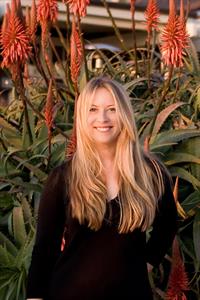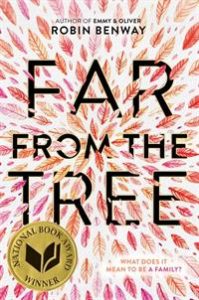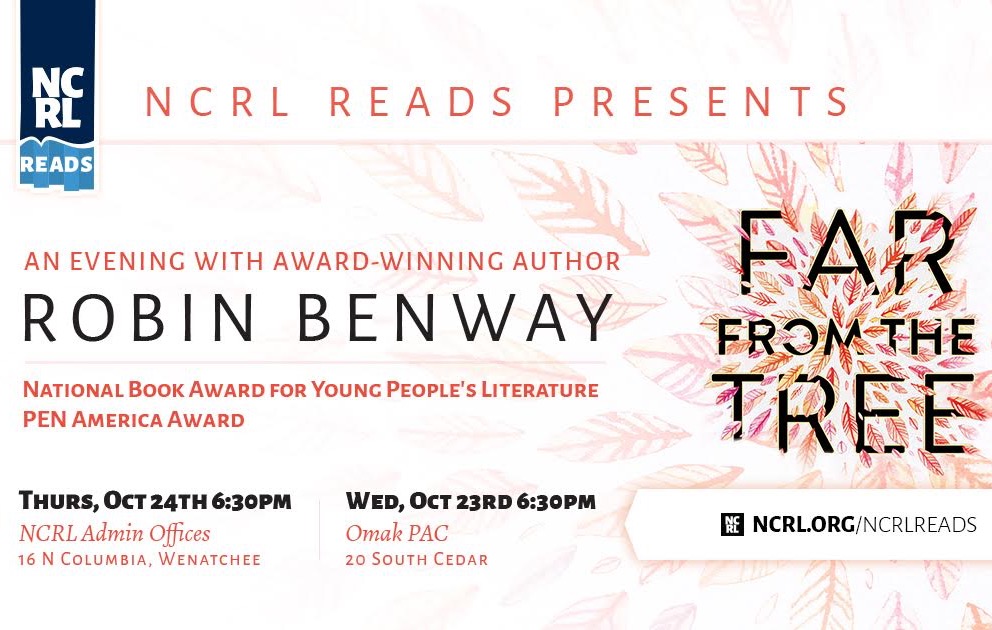Bestselling author Robin Benway will be here for her week-long residency in just two weeks!
In anticipation of her visit, we recently interviewed Robin from her home in Los Angeles. Here’s some of what she had to say about her National Book Award-winning young adult novel Far From the Tree, her writing process and even her rescue dog, Hudson:
 What do you enjoy most about writing for young adults?
What do you enjoy most about writing for young adults?
RB: They are so passionate at that age. They call you out really fast when you get it wrong. I like that I feel like I have to earn their trust. There’s something really special about that age — being on the cusp of so much but you’re not quite there yet. You’re still a kid but feel so much like an adult. I like the push and pull of that, there’s so much tension there.
What will you talk about during your school visits?
RB: When I talk to students, I talk mostly about failure. I walk the kids through every failure I’ve had in writing and how it lead me to the success of Far From the Tree. As a society, we don’t talk about failure enough. But it’s important to talk about failure, and how you get back up from it … Students ask such smart questions. I love when kids ask questions I’ve never thought about. I mean, I wrote this book and I’ve been talking about it for two years, and I never thought of that. I love that a 16-year old is asking me something that’s stumping me about my own characters and my own book.
Where did the idea for the book come from?
RB: I had been visiting my mom, despondent and heartbroken over ideas not panning out for a book. I was stuck. I didn’t even have writer’s block because I didn’t even have an idea to have writer’s block about. I thought my writing career was over. I was sitting in the car outside of Costco and a Florence and the Machine song came on the radio. The opening line of the song was “A falling star fell from your heart and landed in my eye,” and the idea for Grace came immediately! Then Joaquin and Maya right after. I am grateful every single day for that experience. It’s such a whacky, random thing; goes to show that sometimes you just have to get out of your own head and your own way. You can chase an idea and it just keeps moving away from you. Then it can just come to you.
I’ve read interviews where you’ve talked about there being many different ways of defining family. What is family to you?
RB: My family is my core family. They are blood and they are always there for me, support me, encourage me. I have friends I would consider family because of the way that they show up for me. Family is a safe place to come back to again and again. For some kids, their family doesn’t give them that safety or encouragement. They create family from their friends. That to me is just as valid as my blood relations.
How do you hope people are affected by the book?
RB: I hope they realize the importance of supporting one another and supporting the people in their lives. Reading about Grace and Maya and Joaquin’s experiences helps build empathy. It’s easy to look at a teenage girl who is pregnant and name call or judge her. Just because you haven’t experienced this issue of teen pregnancy, if you read Grace’s story maybe you can understand a little more about her fears and her feelings. I hope more than anything that they feel empathetic toward these characters and take that out into the world.
What was the hardest part of the book to write?
RB: Joaquin has a secret that it takes a long time to confess. I really didn’t know what that secret was for almost a year. I just kept writing. Once I realized what it was, my heart broke. It made me feel like I had earned his trust to finally know that secret. I know it’s strange, he’s fictional. That scene at the end with the photographs, when I wrote that I cried the whole way through it. I really wanted Joaquin to have that.
The three siblings seem so real, so well developed. What was the process like for you to develop them?
RB: The book was originally supposed to be narrated by Grace and only Grace. I wrote the first 100 pages first person from Grace’s perspective. Then I realized that she couldn’t tell Maya and Joaquin’s stories. So I went back, pulled apart the book and made it third person. By taking Grace out of the narration, having it told third party, she couldn’t put up a defense. Once I started writing Maya and Joaquin’s stories, it was like they had been waiting their whole lives to tell their stories … Once I figured that out, it blew the book wide open.
 When you finished Far From the Tree, did you know it was National Book Award worthy?
When you finished Far From the Tree, did you know it was National Book Award worthy?
RB: I knew it was good. I felt very proud of it. But I never in a million years could have anticipated the reception. When it got long-listed for the award, I thought, OK, this is different … I didn’t think it was going to win. I mean, look at the caliber for books that year. So I wasn’t nervous at all (at the awards dinner). When they said the book, I remember I was sitting at a round table, everybody stood up and pushed their chair back. I was still sitting there. It felt like the tide going out. Even now, I want to cry just thinking about it. It wasn’t even on my pie-in-the-sky-dream author experience … It was the best night of my life. I wish every author could have an experience like that.
I read your article in Bustle about refinishing the dresser when you were stuck on Far From the Tree? Was that your first refinishing project? Is it now a regular part of your writing process?
RB: I had done a little entry table before, but that dresser was the biggest thing I had ever done. It was a nine-drawer dresser and I live in a small, one-bedroom apartment. To do a piece of furniture like that, every day it looks different. You see the change. It’s very satisfying. I now look on Craigslist every morning. I love to find cheap pieces of furniture and restore them. It lets my brain relax and unwind, lets me think about characters while I’m painting or scraping paint off.
What are you reading, or have recently read, that you would recommend? Anything on your TBR pile you’d care to share?
RB: Daisy Jones & the Six by Taylor Jenkins Reid; All the Birds Singing by Evie Wild, Normal People by Sally Rooney. I just got She Said by Jodi Kantor, Red at the Bone by Jacqueline Woodson, Revolution of Birdie Randolph by Brandi Colbert. It’s an embarrassment of riches with literature right now. There are just so many great books out there to choose from. You read one and it leads to 10 more.
 Are you working on anything right now?
Are you working on anything right now?
RB: I took a little time off after Far From the Tree. After having that great experience, I wanted to hang onto it awhile. I wanted to enjoy the response. I have an idea for a new book. I’m at the beginning of the writing phase, kind of do-si-do-ing with the characters right now. I’m getting them to trust me. It takes time. By the end we’re best friends, but in the beginning we’re a little leery of each other.
So, tell us something about your rescue dog, Hudson.
RB: He snores like a chainsaw. He sleeps at the end of my bed. The top of his head always smells like pancakes. He’s super calm, super mellow. He doesn’t bark. He has a funny little attitude. He was found on a freeway in downtown Los Angeles. When I went to the shelter to find a dog, they were showing me another one and it just wasn’t the right one. Then they brought Hudson in and I knew immediately that this is my dog.
